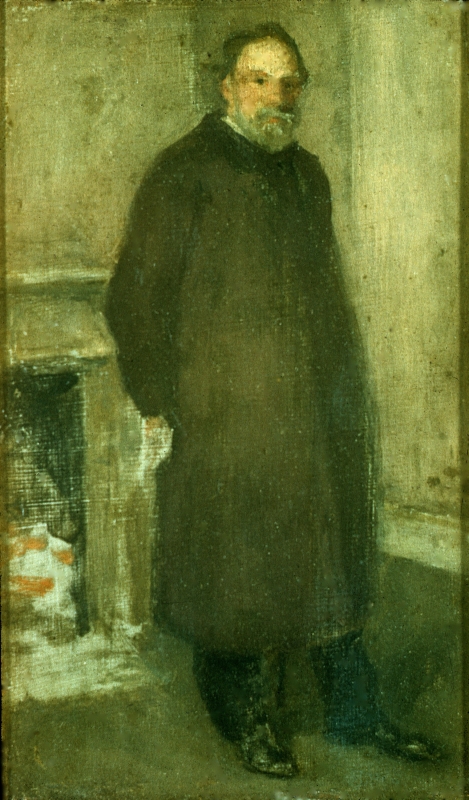Provenance
- 1898/1903: sold by Georges Petit, Paris art dealer, to Beatrice Winans (Comtesse de Béarn) (1884-1907) ;
- 1907: after her death, passed by family descent to Octave Marie Hubert de Ganay, Marquis de Ganay (1888-1974) ;
- 1974: after his death, passed by family descent to a private collector.
After the memorial exhibition of Holloway's watercolours at the Goupil Gallery in February 1897, where it was shown (but not catalogued) it was returned to Whistler, but by the following month David Croal Thomson (1855-1930) of the Goupil Gallery wanted to show it to a 'customer' and Whistler agreed. 1 Possibly the negotiations were a reason for Whistler to withdraw his exhibits from the Salon de la Société Nationale de Beaux-Arts, as Le Figaro reported. 2 Shortly after that, on 21 May 1897, Whistler wrote to the New York art dealer, Edward Guthrie Kennedy (1849-1932), from Paris, ' "the Philosopher"- the little Holloway is carried off to London - to be placed.' 3 However, it appears still to have been in Whistler's hands and available for exhibition a year later. After the ISSPG show of 1898 it was returned to Whistler's business outlet, the Company of the Butterfly, and he told Christine Anderson (fl. 1898) that if Arthur Jerome Eddy (1859-1920) called, 'Then you could say that the little Philosopher, might go to him for £280 - though the price is 300 gs.' 4
It is said to have been acquired through Georges Petit, shortly before Whistler's death, by the Comtesse de Béarn, Paris, and passed by family succession to the Comte de Ganay.
Exhibitions
- 1897: Watercolour Drawings by C.E. Holloway, Goupil Gallery, London, 1897 (not catalogued) as 'The Philosopher'.
- 1897: Exposition Nationale des Beaux-Arts, 7th exhibition, Société Nationale des Beaux-Arts, Champs de Mars, Paris, 1897 (cat. no. 1258) as 'Rose et gris; – le philosophe (portrait)' (intended for exhibition but not sent).
- 1897: 7th exhibition, Society of Portrait Painters, London, 1897 (cat. no. 11) as 'Rose and Brown, The Philosopher'.
- 1898: Exhibition of International Art, International Society of Sculptors, Painters and Gravers, Knightsbridge, London, 1898 (cat. no. 181) de luxe edition, repr. f.p. 108.
- 1905: Memorial Exhibition of the Works of the late James McNeill Whistler, First President of The International Society of Sculptors, Painters and Gravers, New Gallery, Regent Street, London, 1905 (cat. no. 96) as 'The Philosopher' and, in deluxe edition, as 'The Philosopher / Portrait of C. E. Holloway, Esq.'
- 1905: Œuvres de James McNeill Whistler, Palais de l'Ecole des Beaux-Arts, Paris, 1905 (cat. no. 30) as 'The Philosopher'.
It was exhibited several times shortly after the death of the sitter, starting with the memorial exhibition of Holloway's watercolours at the Goupil Gallery.
In 1898 Whistler suggested a possible arrangement for his pictures at the ISSPG, where he showed a mixture of early and recent work: The Thames in Ice [YMSM 036], Grey and Silver: La Petite Souris [YMSM 502], At the Piano [YMSM 024], Arrangement in Brown and Black: Portrait of Miss Rosa Corder [YMSM 203], La Princesse du pays de la porcelaine [YMSM 050], Rose and Brown: The Philosopher [YMSM 472], Blue and Coral: The Little Blue Bonnet [YMSM 500], Nocturne in Blue and Gold: Valparaiso Bay [YMSM 076], and, at the last minute, Gold and Brown [YMSM 462]. 5
Furthermore, he instructed Albert Ludovici, Jr (1852-1932) in detail:
[sketch of pictures upon wall, numbered left to right:] '6 5 4 1. 3 2. 7. 8 9' [and three frames numbered:] '10.'
'1. Rosa Corder. 2. Princess. 3. Portrait. 4. Piano. 5. Oval. 6. Thames in ice. 7. Philosopher. 8. Nocturne Valparaiso. 9. Petite Souris (girls head with feather boa) 10. "Etchings by Mrs McNeill Whistler".
Or [sketch of pictures numbered left to right:] 2 10 7. 8 9. Yes this * last way I prefer - and it gives you no trouble - Hang all my pictures on the line - excepting the Holloway (Philosopher) just a tiny bit up to make the line pretty - and perhaps the Petite Souris - also slightly - a matter for your eye - And be sure to see to the proper tilting over - so that can be well seen ... Hang nothing under any of the pictures.' 6
After all this effort, this particular painting received mixed reviews, admired, for instance, as the 'indescribably subtle likeness of a man' by the Pall Mall Gazette on 16 May 1898 but disliked by The Builder of 21 May.
Filippo Grimani (1850-1921) requested it for exhibition in the III Esposizione Internazionale d'Arte della Città di Venezia, Venice, 1899, but it is not known if it was exhibited. 7
Notes:
1: [23 March 1897], GUW #08422.
2: Le Figaro, 24 April 1897 [more] : ‘Or, au dernier moment, et pour des raisons que nous ignorons, M. Whistler s’est abstenu, et il n’est représenté par aucune toile au Champ-de-Mars.’ The Exhibition catalogue Paris 1897 (Société nationale)[more] still includes Whistler (misspelt as ‘Whisthler’).
4: [August/September 1898], GUW #00792.
5: Whistler to A. Ludovici, [26/30 April 1898], GUW #08075.
Last updated: 13th November 2020 by Margaret







